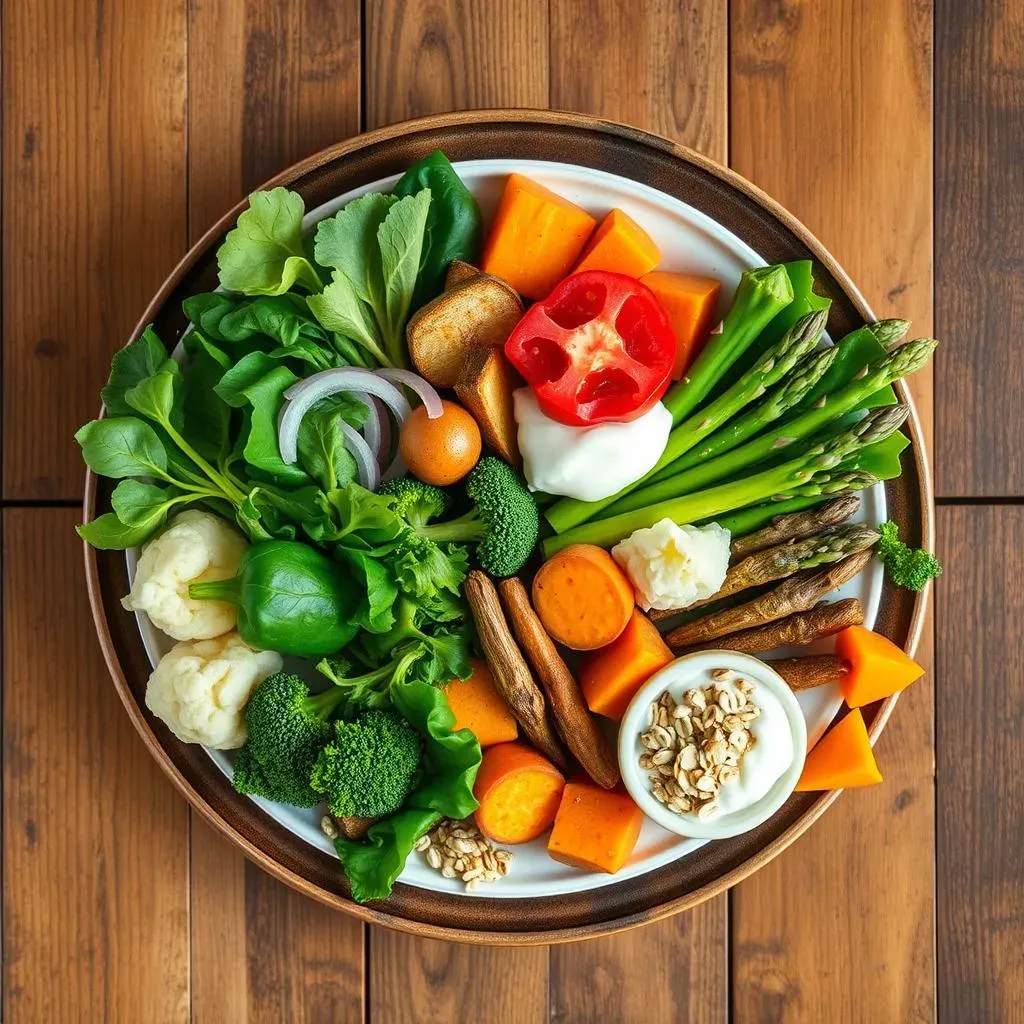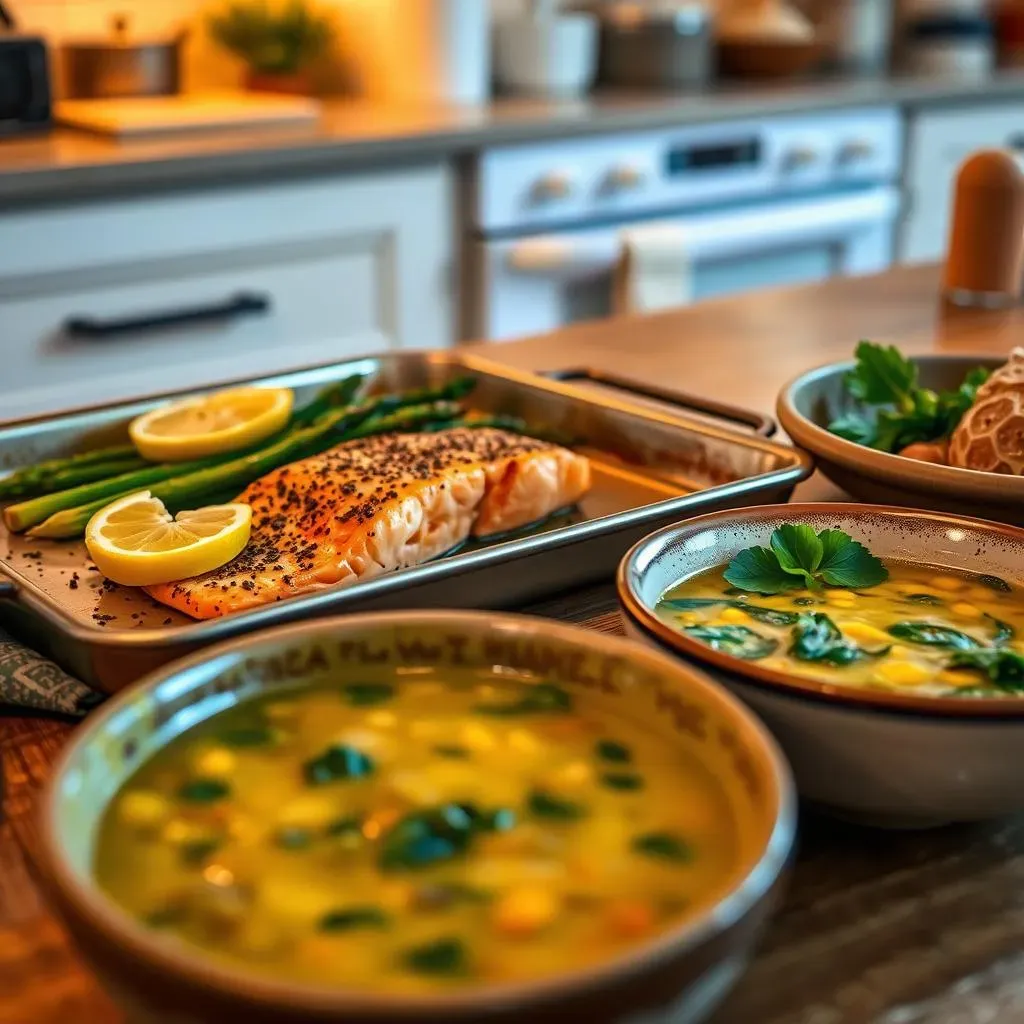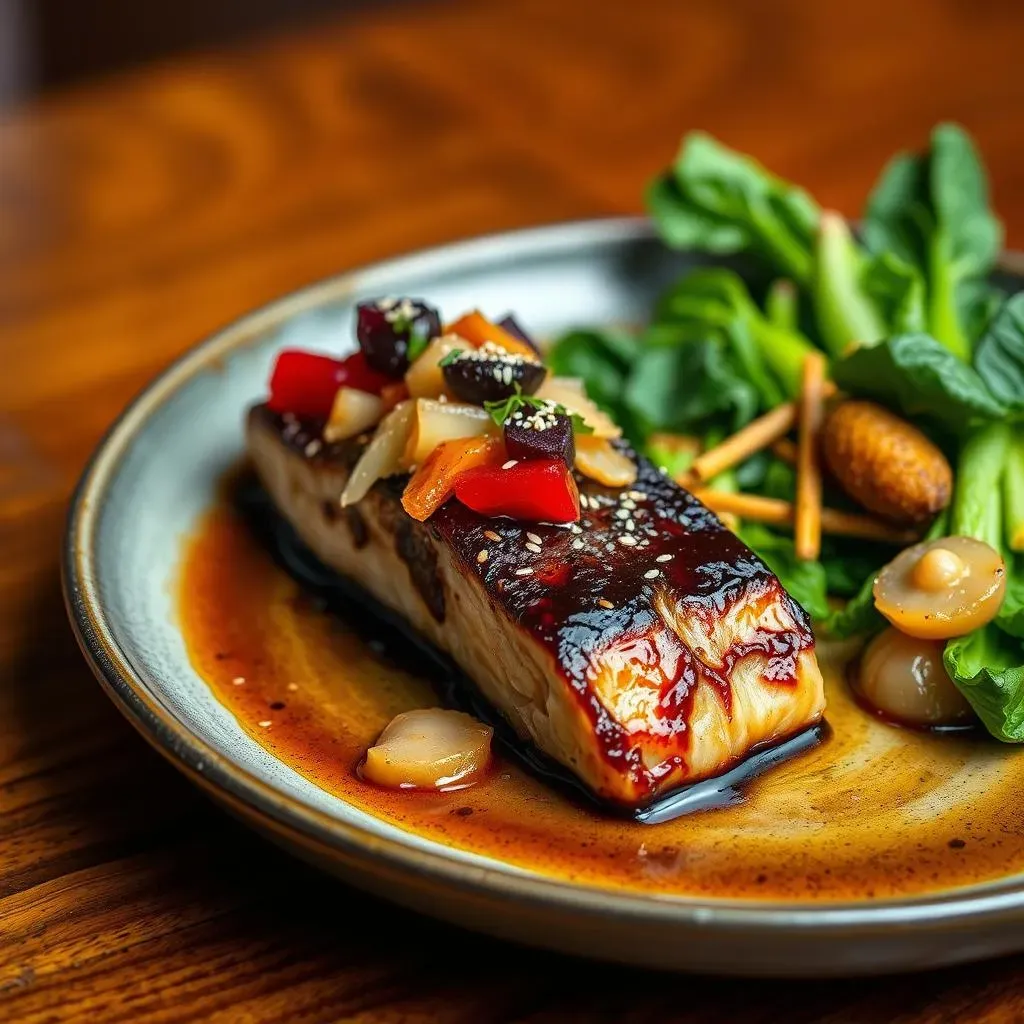Table of Contents
Feeling bloated, sluggish, or just plain blah? Your gut might be trying to tell you something! The key to overall wellness often starts right in your digestive system. That's why incorporating a gut healthy dinner into your routine can be a game-changer. But before you resign yourself to bland meals, know this: eating for your gut can be incredibly delicious and satisfying.
Understanding Gut Health and Its Importance

Understanding Gut Health and Its Importance
so why is everyone suddenly obsessed with gut health? It's not just a trendy topic; it's the foundation of your overall well-being. Your gut, home to trillions of bacteria, fungi, and other microbes (your gut microbiome), plays a massive role in everything from digesting your food and absorbing nutrients to regulating your immune system and even influencing your mood. Think of your gut as a bustling city where different microbial communities are constantly interacting. When this city is balanced and thriving, you feel great. But when the balance is disrupted, that's when problems start to arise.
An unhealthy gut, often referred to as gut dysbiosis, can manifest in various ways: digestive issues like bloating, gas, constipation, or diarrhea, weakened immunity leading to frequent colds or infections, skin problems like eczema or acne, fatigue, and even mood disorders like anxiety and depression. The gut-brain connection is real! An unhealthy gut can send signals to your brain, impacting your mental state. So, taking care of your gut is not just about avoiding stomach aches; it's about supporting your physical and mental health.
So, how do you know if your gut needs some love? While everyone experiences occasional digestive discomfort, persistent symptoms warrant attention. Certain lifestyle factors, like a diet high in processed foods, sugar, and unhealthy fats, chronic stress, lack of sleep, and overuse of antibiotics, can wreak havoc on your gut microbiome. The good news is that you can actively cultivate a healthier gut through dietary changes and lifestyle adjustments. And it all starts with what you put on your plate, especially at dinner.
Key Ingredients for a Gut Healthy Dinner

Key Ingredients for a Gut Healthy Dinner
Prebiotic Powerhouses: Fueling the Good Guys
Prebiotics are non-digestible fibers that act as food for the beneficial bacteria in your gut. Think of them as fertilizer for your microbiome! When you eat prebiotic-rich foods, you're essentially feeding the good bacteria, helping them thrive and outcompete the bad guys. This leads to a more diverse and balanced gut ecosystem. Some of the best prebiotic sources to include in your gut healthy dinner are:
- Onions and Garlic: These pungent veggies are packed with inulin and fructans, potent prebiotics that support the growth of Bifidobacteria, a type of beneficial bacteria.
- Leeks: Similar to onions and garlic, leeks are a great source of prebiotics and add a mild, savory flavor to dishes.
- Asparagus: This spring vegetable is rich in inulin and provides a good dose of vitamins and minerals.
- Oats: A bowl of oatmeal isn't just for breakfast! Oats contain beta-glucan, a soluble fiber that promotes gut health.
- Bananas (slightly green): Green bananas are higher in resistant starch, a type of prebiotic fiber that resists digestion in the small intestine and becomes food for gut bacteria in the large intestine.
Probiotic-Rich Foods: Adding to the Microbial Mix
While prebiotics feed the existing good bacteria, probiotics introduce new beneficial bacteria into your gut. These live microorganisms can help improve digestion, boost immunity, and even enhance nutrient absorption. Incorporating probiotic-rich foods into your gut healthy dinner is a fantastic way to diversify your microbiome. Here are some top choices:
- Yogurt (plain, unsweetened): Look for yogurts that contain live and active cultures, such as Lactobacillus and Bifidobacterium.
- Kefir: This fermented milk drink is similar to yogurt but has a thinner consistency and a slightly tart flavor. It's also packed with probiotics.
- Kimchi: This Korean staple is made from fermented vegetables, typically cabbage and radish, and is a rich source of probiotics.
- Sauerkraut: Similar to kimchi, sauerkraut is made from fermented cabbage and offers a tangy, probiotic-rich addition to meals.
- Miso: This traditional Japanese seasoning is made from fermented soybeans and is a good source of probiotics and umami flavor.
Important Note: When introducing fermented foods, start small to avoid digestive upset.
Fiber-Filled Vegetables: The Cornerstone of Gut Health
Fiber is essential for a healthy gut. It adds bulk to your stool, promoting regular bowel movements and preventing constipation. But more importantly, fiber serves as another source of food for your gut bacteria. Many vegetables are excellent sources of both soluble and insoluble fiber, contributing to a thriving gut microbiome. Load up your gut healthy dinner with these fiber-rich veggies:
- Leafy Greens (spinach, kale, collard greens): These are nutritional powerhouses packed with fiber, vitamins, and minerals.
- Cruciferous Vegetables (broccoli, cauliflower, Brussels sprouts): These veggies contain glucosinolates, compounds that have been shown to have anti-inflammatory and anti-cancer properties.
- Sweet Potatoes: These orange tubers are rich in fiber, vitamins, and antioxidants.
- Carrots: Carrots are a good source of fiber and beta-carotene, which converts to vitamin A in the body.
- Bell Peppers: These colorful veggies are packed with vitamins, minerals, and fiber.
Combining these ingredients will help you create a gut healthy dinner that’s also delicious and satisfying.
Quick & Easy Gut Healthy Dinner Recipes for Weeknights

Quick & Easy Gut Healthy Dinner Recipes for Weeknights
Sheet Pan Salmon with Asparagus and Lemon
Weeknights are hectic, and the last thing anyone wants is to spend hours in the kitchen. This sheet pan salmon recipe is not only quick and easy but also packed with gut-friendly ingredients. Salmon is rich in omega-3 fatty acids, which have anti-inflammatory properties that can benefit your gut. Asparagus is a prebiotic powerhouse, feeding your good gut bacteria, and lemon adds a zesty flavor and a boost of vitamin C.
Simply toss asparagus with olive oil, salt, and pepper, and arrange it on a baking sheet. Place salmon fillets on the same sheet, drizzle with olive oil and lemon juice, and season with salt, pepper, and any other herbs you like (dill and parsley work great). Bake at 400°F (200°C) for 12-15 minutes, or until the salmon is cooked through. Serve immediately and enjoy a delicious and gut healthy dinner in under 30 minutes!
One-Pot Lentil Soup with Spinach and Turmeric
Soups are a fantastic way to pack a lot of nutrients into one easy meal, and this lentil soup is no exception. Lentils are an excellent source of prebiotic fiber, promoting the growth of beneficial bacteria in your gut. Spinach adds extra fiber and vitamins, while turmeric boasts anti-inflammatory properties. This soup is also incredibly versatile – feel free to add other vegetables like carrots, celery, or zucchini.
In a large pot, sauté diced onion and garlic in olive oil until softened. Add lentils, vegetable broth, diced tomatoes, spinach, turmeric, and any other desired spices (cumin and coriander work well). Bring to a boil, then reduce heat and simmer for 20-25 minutes, or until the lentils are tender. Season with salt and pepper to taste. You can even add a dollop of plain yogurt for a probiotic boost! This hearty and comforting soup makes a perfect gut healthy dinner on a chilly evening.
Recipe | Key Gut-Friendly Ingredient | Prep Time | Cook Time |
|---|---|---|---|
Sheet Pan Salmon | Asparagus | 5 minutes | 15 minutes |
Lentil Soup | Lentils | 10 minutes | 25 minutes |
Advanced Gut Healthy Dinner Ideas for Foodies

Advanced Gut Healthy Dinner Ideas for Foodies
Alright, fellow food enthusiasts, ready to take your gut health game to the next level? We're moving beyond the basics and diving into some seriously delicious and inventive gut healthy dinner ideas. These recipes are for those who love experimenting in the kitchen and aren't afraid to try new flavors and techniques. Think globally-inspired dishes packed with unique ingredients that will not only tantalize your taste buds but also nourish your microbiome. This is where gut health meets gourmet!
Miso-Glazed Black Cod with Fermented Vegetables
Black cod, also known as sablefish, is a buttery, melt-in-your-mouth fish that's rich in omega-3 fatty acids, making it a fantastic choice for gut health. The miso glaze adds a savory umami flavor and provides a dose of probiotics, thanks to the fermented soybeans. Pair it with a colorful assortment of fermented vegetables like kimchi, sauerkraut, or pickled beets for an extra probiotic boost and a delightful textural contrast.
To make the miso glaze, whisk together miso paste, mirin, soy sauce, and a touch of honey. Brush the glaze over the black cod fillets and bake at 375°F (190°C) for 12-15 minutes, or until cooked through. Serve with a side of your favorite fermented vegetables and a sprinkle of sesame seeds for a truly unforgettable gut healthy dinner.
Moroccan Tagine with Lamb, Apricots, and Chickpeas
Transport your taste buds to Morocco with this flavorful and aromatic tagine. Lamb is a good source of protein and iron, while apricots add a touch of sweetness and fiber. Chickpeas are a prebiotic powerhouse, feeding your good gut bacteria. The combination of spices like cumin, coriander, ginger, and turmeric not only creates a complex and delicious flavor profile but also offers anti-inflammatory benefits.
In a tagine or Dutch oven, brown lamb pieces in olive oil. Add diced onion, garlic, and spices, and cook for a few minutes until fragrant. Stir in vegetable broth, diced tomatoes, apricots, and chickpeas. Bring to a boil, then reduce heat and simmer for 1-1.5 hours, or until the lamb is tender. Serve with a sprinkle of fresh cilantro and a dollop of plain yogurt for a probiotic boost. This tagine is a true celebration of flavor and gut health!
Recipe | Key Gut-Friendly Ingredient | Cuisine Inspiration | Difficulty Level |
|---|---|---|---|
Miso-Glazed Black Cod | Miso | Japanese | Medium |
Moroccan Tagine | Chickpeas | Moroccan | Medium |
Korean Bibimbap with Kimchi and Gochujang
Bibimbap is a vibrant and customizable Korean rice bowl that's perfect for incorporating a variety of gut-friendly ingredients. Start with a base of brown rice for extra fiber, then top with a colorful assortment of sautéed vegetables like spinach, carrots, mushrooms, and bean sprouts. Add a protein of your choice, such as marinated tofu or bulgogi (thinly sliced beef). The star of the show is the kimchi, a fermented Korean staple that's packed with probiotics. Drizzle with gochujang, a fermented chili paste, for a spicy kick and even more gut-friendly benefits.
Assemble your bibimbap bowl by arranging the rice, vegetables, protein, and kimchi in separate sections. Top with a fried egg and a sprinkle of sesame seeds. Mix everything together before eating and enjoy a delicious and satisfying gut healthy dinner that's bursting with flavor and probiotics.
Maintaining LongTerm Gut Health Through Diet

Maintaining LongTerm Gut Health Through Diet
so you've whipped up some amazing gut healthy dinner recipes, but the journey doesn't end there! Think of it like this: you've planted a beautiful garden, now you need to tend to it regularly to keep it thriving. Maintaining long-term gut health through diet is all about making sustainable choices that nourish your microbiome day in and day out. It's not about quick fixes or restrictive diets; it's about creating a lifestyle that supports a diverse and balanced gut ecosystem.
One of the most important aspects of maintaining long-term gut health through diet is to focus on variety. Don't get stuck eating the same gut-friendly foods every day. Aim to incorporate a wide range of prebiotic and probiotic sources, as well as plenty of fiber-rich vegetables and fruits. This will ensure that you're feeding all the different types of beneficial bacteria in your gut. Also, pay attention to how your body responds to different foods. Everyone's gut microbiome is unique, so what works for one person may not work for another. Keep a food journal to track your symptoms and identify any potential trigger foods.
Beyond specific foods, there are also some general dietary principles that can support long-term gut health. Limit your intake of processed foods, sugar, and unhealthy fats, as these can feed the bad bacteria in your gut and contribute to inflammation. Stay hydrated by drinking plenty of water throughout the day, as water is essential for proper digestion and bowel movements. Manage stress levels, as chronic stress can negatively impact your gut microbiome. And finally, consider incorporating other gut-friendly habits into your routine, such as getting regular exercise, getting enough sleep, and avoiding overuse of antibiotics.
- Eat a diverse range of plant-based foods: Aim for at least 30 different plant-based foods per week.
- Stay hydrated: Drink plenty of water throughout the day.
- Manage stress: Practice stress-reducing activities like yoga or meditation.
- Get enough sleep: Aim for 7-8 hours of quality sleep per night.
- Limit processed foods, sugar, and unhealthy fats: These can disrupt your gut microbiome.
Conclusion: Embrace the Gut Healthy Dinner Lifestyle
Prioritizing a gut healthy dinner isn't just a fleeting trend; it's an investment in your long-term well-being. By incorporating the knowledge and recipes shared in this article, you're well-equipped to make informed choices that support a thriving gut microbiome. Remember to focus on whole, unprocessed foods, embrace variety, and listen to your body's cues. From quick weeknight meals to more elaborate culinary creations, a gut healthy dinner can be both delicious and beneficial. Start experimenting, find what works best for you, and enjoy the positive ripple effects on your overall health and happiness. Bon appétit to a happier, healthier gut!